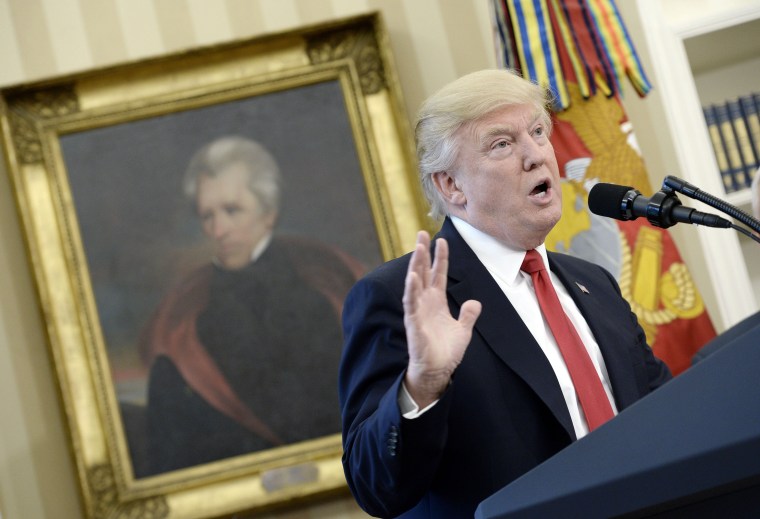As Congress faces an April 28 deadline to fund government operations, the public is now split in their general preferences on the size and scope of government: 48% say they would rather have a bigger government providing more services, while 45% prefer a smaller government providing fewer services.This marks the first time in eight years that as many Americans have expressed a preference for a bigger as a smaller government. Support for bigger government has increased 7 percentage points since last September, when more said they preferred a smaller government offering fewer services (50%) than a bigger government providing more services (41%). The last time the public was divided on this question was in October 2008, just prior to the election of Barack Obama.
Under Trump, the era of big government is making a comeback
For the first time in quite a while, much of the public wants a bigger government and increased federal spending. Thank Donald Trump for the shift.

An NBC News/Wall Street Journal poll released this week found that 57% of the country believes the government should do more to solve problems and meet the needs of Americans, as compared to 39% who believe the government is doing too much. That's striking at face value, but consider some historical context.This same poll has been asking this same question for more than two decades, and these results are the most progressive responses ever seen.The Pew Research Center's latest results on a similar question were a little different, but the data nevertheless pointed to a similar trend in Americans' attitudes.
The same national survey pointed to growing support among Americans for increased government spending on a wide range of public priorities, including benefits for veterans, education, infrastructure, health care, and scientific research.The next question is what's driving the changes in Americans' attitudes.Some of this seems can be chalked up to a paradoxical dynamic: much the public wants what it doesn't have. In recent decades, Americans' support for bigger government tends to shrink during Democratic presidencies and grow during Republican presidencies.But the Washington Post raised a related point about the significance of Donald Trump's rhetoric: "While other Republicans will at least talk a good game about shrinking government, he hasn't really bothered; instead he has talked about a $1 trillion infrastructure plan and increasing government borrowing while borrowing is cheap. He gave lip service to balancing the budget as president, but as with many Trump goals, it has quickly gone by the wayside. The White House isn't even pretending that is still a goal."All things considered, I tend to think the debate over the size of government has long been more of a distraction than a genuine dividing line. The parties tend to care more about how the government divides and distributes resources.But the Post's point nevertheless seems to have merit: Trump may echo GOP orthodoxy on many issues, but I don't imagine many Americans see him as a champion of shrinking government to the size in which it can be "drowned in a bathtub," to use Grover Norquist's grotesque metaphor.In a separate Washington Post piece, Paul Waldman added yesterday, "During the 2016 campaign, [Trump] made a lot of conservatives uneasy by saying that he wasn't going to touch the programs Americans love, such as Social Security and Medicare. But he also made far more ambitious promises about government -- not just that he'd do specific things such as build up infrastructure, but that if we gave him the presidency he'd solve every problem anyone faces. Despite some occasional criticism of regulation, Trump didn't use the traditional Republican rhetoric about 'empowering' people by getting government out of their way. He didn't characterize Americans as a force waiting to be unleashed; in his telling, the only active force was Trump himself, and once he had government power at his disposal he'd bring us so much winning we'd get tired of winning."Just so we're clear, this is not to say Trump should be seen as a champion of bigger government, because reality tells a very different story. Take a good look at the White House's agenda -- Trump's brutal budget, plans to decimate Wall Street safeguards, ongoing efforts to eliminate environmental regulations -- and the sweeping consequences of having a Republican administration in power become quite clear.But when it comes to understanding shifts in public attitudes, Trump told the electorate that he was eager to use the power of the state to solve practically every problem under the sun, and a significant chunk of the electorate believed him. Is it any wonder a growing number of Americans are starting to embrace the idea the government should do more to help the public?